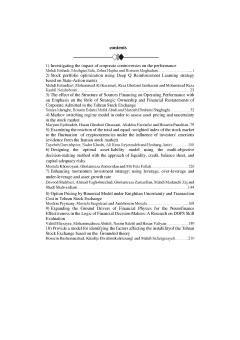Investigating the impact of corporate controversies on the performance
Subject Areas : Stock Exchange
Mehdi ershadi
1
,
mozhgan safa
2
*
![]() ,
Zohreh Hajiha
3
,
Hossein Moghadam
4
,
Zohreh Hajiha
3
,
Hossein Moghadam
4
1 - Ph.D Candidate of Accounting, Qom Branch, Islamic Azad University, Qom, Iran.
2 - Department of Accounting, Qom Branch, Islamic Azad University, Qom, Iran
3 - Department of Accounting, East Tehran Branch, Islamic Azad University, Tehran, Iran
4 - Department of Accounting, Qom Branch, Islamic Azad University, Qom, Iran.
Keywords: Return on assets, Return on equity, company performance, Economic Added Value, corporate controversies,
Abstract :
Purpose: This research was carried out with the aim of investigating the effect of corporate controversies on the performance of companies in the Tehran Stock Exchange.Method: In this research, the required data were extracted from Rahavard Novin software, financial statements of companies and text mining, as well as the Tehran Stock Exchange website. The statistical population of the current research is the companies listed in the Tehran Stock Exchange in the period from 1391 to 1400. In order to test the research hypotheses, the combined data model was used. The software used for data analysis is Stata version 14.Findings: The results of research hypotheses show that three performance calculation criteria (return on assets, return on equity, economic added value) are negatively affected by company controversies. In other words, increasing the level of controversy with controversial and tension-causing factors reduces the ability of management to a significant extent.Conclusion: The negative perception by the stakeholders can have various consequences, including increasing financial risk, increasing the cost of debt, reducing the company's reputation and credibility, which will reduce the company's performance.Keywords: corporate controversies, company performance, return on assets, return on equity, economic added value
_|1) آرین پور، آ؛ حساس یگانه، ی؛ باباجانی، ج. (1398). تحلیل عملکرد پایدار اجتماعی و تأثیر آن بر هزینه سرمایه شرکت های پذیرفته شده در بورس اوراق بهادار تهران. اقتصاد پولی مالی, 26(18),
155-196.
2) اصمدی، ا ، (2019)، "کیفیت گزارشگری مالی، حسابرسی خارجی، قدرت سود و عملکرد شرکت ها: مورد کشورهای شورای شرکت خلیج فارس" ، مجله تحقیقات جهانی شدن، 5 ، 100093
3) بابائی، ف؛ رحمانی، ع؛ همایون، س؛ امین، و. (1400). رابطه بین عملکرد پایداری شرکتی و ارزش شرکت: با تأکید بر نقش امتیاز افشا و اندازه شرکت. مجله دانش حسابداری, 12(3),صص 1-27
4) جعفری جم، ح؛ علی عسگری، ف؛ زارعی، ح. (1398). عملکرد مالی و ارزش شرکتها: نقش افشا اطلاعات پایداری. دانش حسابداری مالی, 6(3), 215-242.
5) حمید، ن، پورباوانگسا ، ای بی ا، (2022) ، تأثیر هیئت مدیره بر عملکرد مالی و سرمایه شرکت: مدیریت ریسک به عنوان یک متغیر مداخله گر، مجله سازمان و مدیریت تعاون،, 10(2), 100164.
6) خوشکار، ف؛ زارعی لاچینی، ج؛ ایوبی، م. (1398). بررسی رابطه مسئولیت اجتماعی با عملکرد مالی شرکت در شرکت های فعال عرضه کننده محصولات بهداشتی. فصلنامه علمی تخصصی رویکردهای پژوهشی نوین در مدیریت و حسابداری, 3(11), 69-86.
7) مالک، م ، (2015) ، قابلیتهای افزایش ارزش مسئولیت اجتماعی شرکت¬ها مروری کوتاه بر ادبیات معاصر ، اخلاق کسب و کار،, 127(2), 419-438.
8) Park, J., Lee, H., & Kim, C. (2014). Corporate social responsibilities, consumer trust and corporate reputation: South Korean consumers' perspectives. Journal of business research, 67(3), 295-302..
9) Nirino, N., Santoro, G., Miglietta, N., & Quaglia, R. (2021). Corporate controversies and company's financial performance: Exploring the moderating role of ESG practices. Technological Forecasting and Social Change, 162, 120341
10) Mohammad, W. M. W., & Wasiuzzaman, S. (2021). Environmental, Social and Governance (ESG) disclosure, competitive advantage and performance of firms in Malaysia. Cleaner Environmental Systems, 2, 100015.
11) Li, J., Haider, Z.A., Jin, X., Yuan, W., 2019. Corporate controversy, social responsibility and market performance: international evidence. J. Int. Financial Markets, Institutions and Money 60, 1–18.
12) Li, C., Wu, M., Chen, X., & Huang, W. (2022). Environmental, social and governance performance, corporate transparency, and credit rating: Some evidence from Chinese A-share listed companies. Pacific-Basin Finance Journal, 74, 101806.
13) Fiore, M., Galati, A., Gołębiewski, J., & Drejerska, N. (2020). Stakeholders' involvement in establishing sustainable business models: The case of Polish dairy cooperatives. British Food Journal, 122(5), 1671-1691.
14) Ferrell, O.C., Harrison, D.E., Ferrell, L., Hair, J.F., 2019. Business ethics, corporate social responsibility, and brand attitudes: an exploratory study. J Bus Res 95, 491–501
15) Dressler, M., & Paunović, I. (2020). Towards a conceptual framework for sustainable business models in the food and beverage industry: The case of German wineries. British Food Journal, 122(5), 1421-1435.
16) Chairani, C; Siregar, S V. (2021). The effect of enterprise risk management on financial performance and firm value: the role of environmental, social and governance performance. Meditari Accountancy Research, 29, (3), pp. 647-670(24).
17) Burke, L., Logsdon, J.M., 1996. How corporate social responsibility pays off. Long Range Plann 29 (4), 495–502.
18) Bogers, M., Chesbrough, H., & Strand, R. (2020). Sustainable open innovation to address a grand challenge: Lessons from Carlsberg and the Green Fiber Bottle. British Food Journal, 122(5), 1505-1517.
19) Birindelli, G., Ferretti, P., Intonti, M., Iannuzzi, A.P., 2015. On the drivers of corporate social responsibility in banks: evidence from an ethical rating model. J. Management Governance 19 (2), 303–340.
20) Belyaeva, Z., Shams, S.R., Santoro, G., Grandhi, B., 2020. Unpacking stakeholder relationship management in the public and private sectors: the comparative insights. EuroMed J. Business.
21) Battisti, E., Miglietta, N., Nirino, N., Diaz, M.V., 2019. Value creation, innovation practice, and competitive advantage. European J. InnovationManagement.
22) Aouadi, A., Marsat, S., 2018. Do ESG controversies matter for firm value? Evidence from international data. J.f Business Ethics 151 (4), 1027–1047.
23) Akbas, F., Markov, S., Subasi, M., Weisbrod, E., 2018. Determinants and consequences ofinformation processing delay: evidence from the Thomson Reuters InstitutionalBrokers’ Estimate System. J financ econmic , 127 (2), 366–388.
|_

